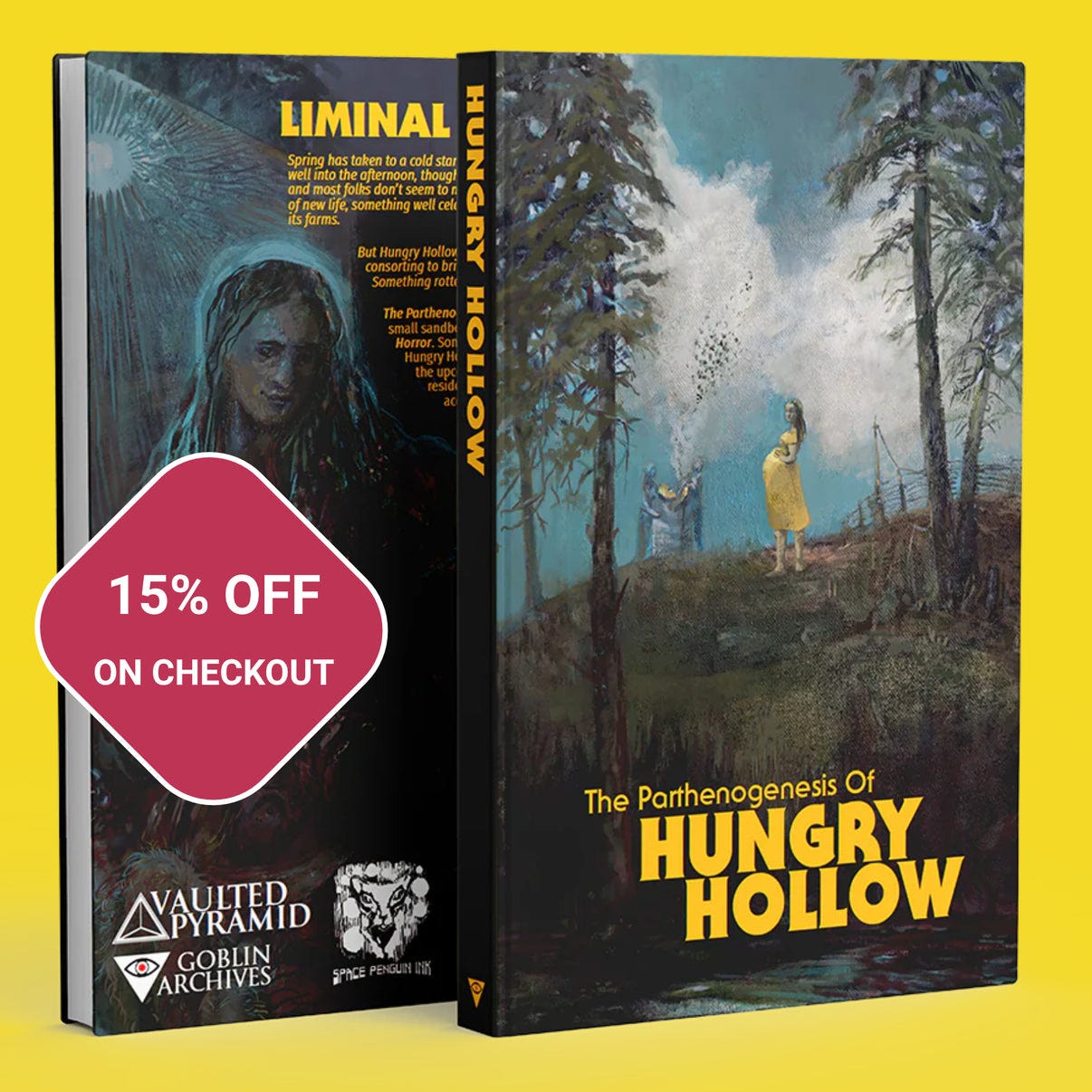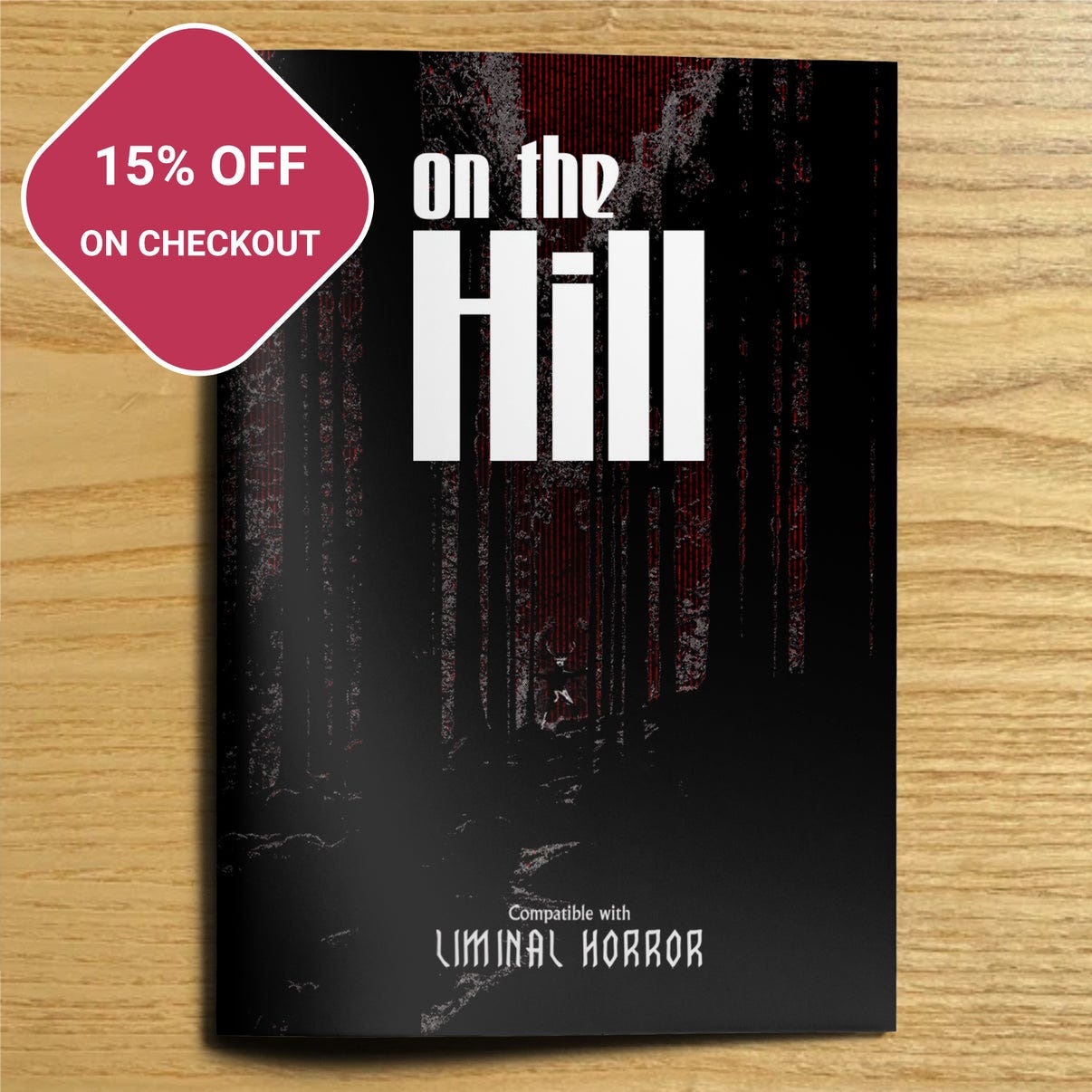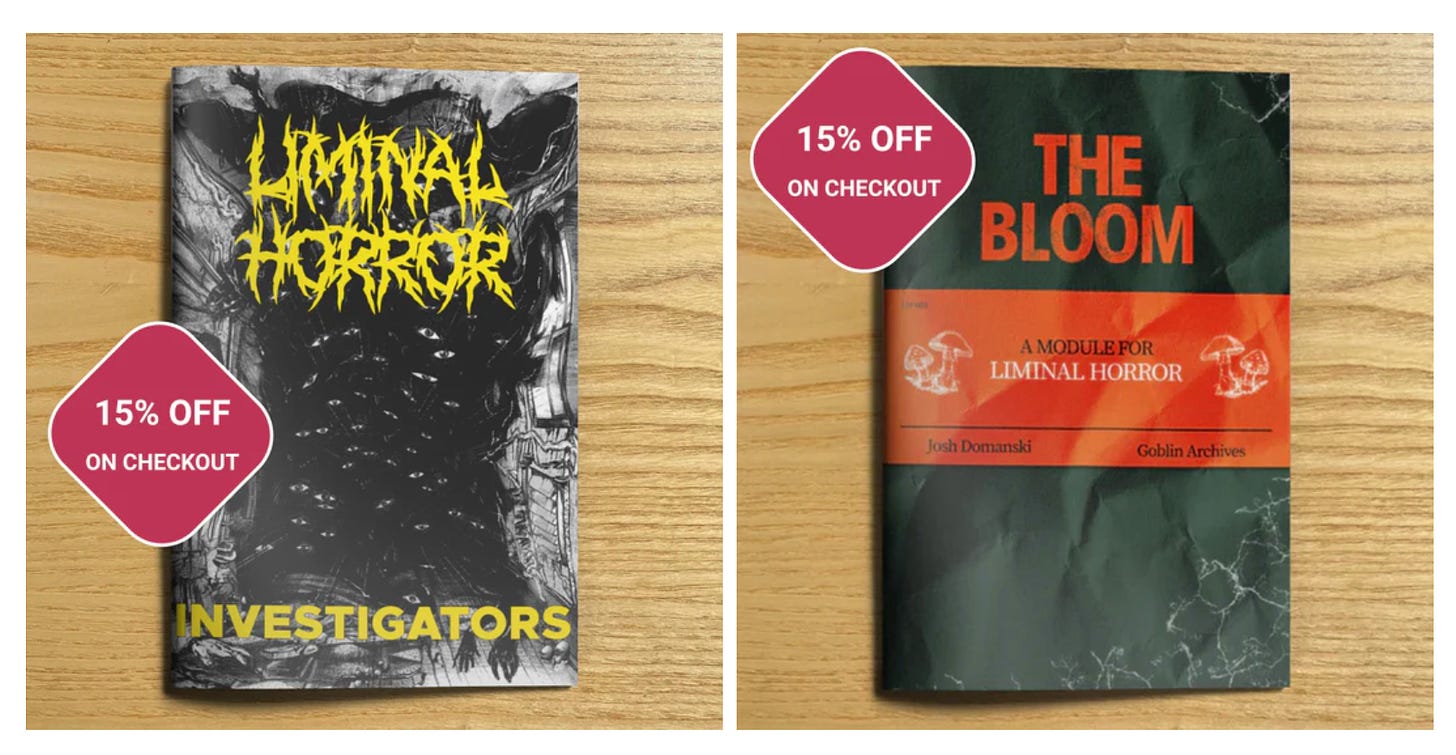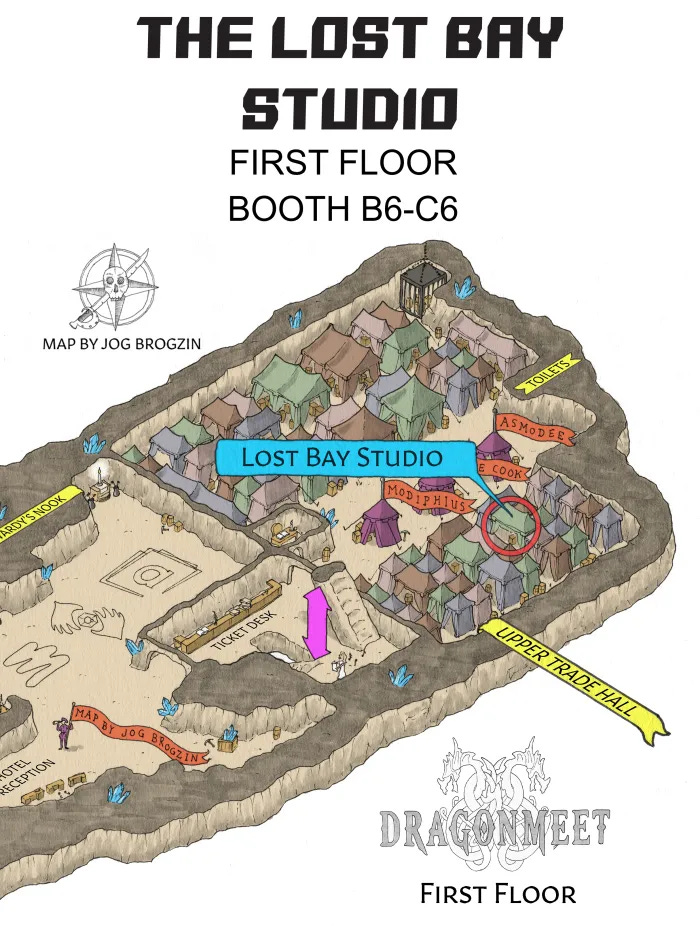Liminal Horror special sale + restock + interview
Get The Parthenogenesis of Hungry Hollow and more..
Hey Bayers
On the menu today
Liminal Horror Special sale and new items
Interlude
Goblin Archives cross-interview
LIMINAL HORROR SPECIAL SALE
THE PARTHENOGENESIS OF HUNGRY HOLLOW
Who doesn't like bees? What about flesh-harvested honey and a mysterious baby shower set in a small town of the Haunted Pacific Northwest? We are extremely excited to announce that the already acclaimed sandbox setting and adventure from Goblin Archives and Josh Domansky is available and on sale at The Lost Bay Studio. Get an entire town with 56 locations, 89 NPCs, and custom procedures wrapped in a beautiful hardback book at 15% OFF.
ON THE HILL
Our very own
, who has released a handful of beautiful The Lost Bay modules, is back with an Appalachian-inspired adventure for Liminal Horror. Who could refuse a Sunday hike in the Gareth Pines State Park and a chance to contemplate (and confront) its wonderful flora and fauna, unique species like the Not Deer, the Toothfrog, and the Choking Tree. Prep your backpack and get On the Hill at 15% OFF.RESTOCKS
Today's Liminal Horror bonanza isn't over. We have restocked the corebook Liminal Horror Investigators and the fungi-infested adventure The Bloom, and they're both 15% OFF. Go get them; limited copies available.
INTERLUDE
We're less than one week away from Dragonmeet 2024! We're ready and set, our luggage is loaded with zines, books, and stickers, including new The Lost Bay modules, Vaults of Vaarn full collection and new module, a special Frenchies collection, Mothership new releases, OSR, solo games, and folks LOTS of cool titles. Come and find myself, and
, on the first floor, booth B6-C6.As a teaser, here's a partial flipthrough of BLADES a collective zine born of the All Flesh is Surplus jam and illustrated and laid out by Scragend.
And BTW, I'm still due to send an AFIS recap, bear with me, I should fire it next week!
GOBLIN ARCHIVES CROSS-INTERVIEW
2024 is the year of modern horror RPGs. Goblin Archives twitted this more than a year ago, or I did, I can't remember. With Goblin we've been chatting regularly about our passion for modern and contemporary horror, and our two games, Liminal Horror, and The Lost Bay share a few things in common, including quite a number of players, GMs, and third-party designers. Here's a chat we had over the end of the summer about RPGs and modern horror.
IKO: Hey Goblin Archives, I’m glad to have you on The Dispatch, and excited about this conversation. Today we’ll chat about Liminal Horror, The Lost Bay, and all things spooky in RPGs. Last year we both said several times, a bit as a joke maybe, that 2024 would be the year of modern horror in tabletop RPG games. For both of us it certainly is. We’ve been pretty busy with our respective games and communities. But is there a trend? And if yes, why is it so?
GOBLIN ARCHIVES: It has been interesting to see that not only in the ttrpg space, but other creative spaces have had modern horror as a major focus. People much smarter than I could make a hypothesis around why creatively we as a culture are giving more focus to horror set in modern(ish) times. Maybe it's about where our current anxieties lie that using the modern framing as a focus is cathartic? All I know is that in the ttrpg space specifically we are having a renaissance of sorts. So many interesting systems and adventures prioritising modern set horror have been coming out (and I think are going to continue to). D&D is always talked about being the big fish in the pond, but with that comes fantasy being the big genre fish.
I’ve always felt that the modern setting is exciting because it draws upon the schema/background we have from day to day life. This makes it easy for any type of player to draw upon personal experience when roleplaying how we survive the weirdness of modern horror.
So we both have been playing a lot in the modern horror space. What about the modern(ish) setting appeals to you as a writer/designer (as opposed to fantasy sci-fi)? Does not having to compete with the heritage of some classic ttrpgs in those other genres help or hinder the process?
IKO: I approached RPGs with fantasy and Sci-Fi games. It's a pretty standard RPG origin story. Everybody in my gaming group was so much into the lore of every fantasy and Sci-Fi book or film, much more than myself. I didn't get the jokes or references at the table; I felt like a tourist. So, I guess, in some way, investing in modern or contemporary settings felt rather liberating, because there isn’t a strong canon to sit on.
I think many popular RPGs plug into some shared unconscious representation, into a cultural network of concepts and emotions that preexist the game. Mothership does that beautifully with Sci-Fi corpo horror, Mörk Borg roots into doom metal fantasy. I feel the difficulty with modern setting PRGs is for them to intercept one of those meshes of concepts and ideas. On the other hand they can contribute to solidifying such shared implied lore.
Speaking about settings, Liminal Horror is setting agnostic, or at least it was when it was first released. You're working on a Haunted Pacific Northwest setting with Josh Domanski, incarnated in several extremely cool official supplements, like The Bloom, or The Parthenogenesis of Hungry Hollow. But beyond that, it seems that the US is becoming the game's implied setting. How did that happen, was it a conscious choice?
GOBLIN ARCHIVES: It wasn’t a conscious choice per se, but it definitely stemmed from writing about what you know. I’ve lived my entire life in the Pacific Northwest, so it is the environment my imagination is steeped in. When I was playing Liminal Horror for the first time, I ran adventures set in my city. Me and my friends told our horror stories set against the backdrop of the places we frequent.
As I started writing official modules, it made sense to weave them through a common locale.
I’m excited because more and more adventures and writers are doing things set outside of the United States. It’s also helped that we’re getting translated into more and more languages (as of now we have French, Spanish, Italian, Portuguese, Russian, Japanese).
In terms of official LH setting, we’re branching out with our newest jam: Horrors of the Americas, where we prompt people to submit short form entries (factions, monsters, NPCs, locations, adventures, resonant artifacts) from around the Americas (North and South) in order to create a sort of field guide.
Iko, we both love to collaborate with others. How have you found working with others to build your ttrpgs? What parts of collaboration fuel the creative fires per say, and what parts do you have to nurture?
IKO: I love working with teams, in teams. More specifically, I love working with members of the international indie RPG scene. I feel lucky that I have met so many like-minded people. (I know the RPG community also has a dark side; I try to dodge it as best as I can.) As a publisher, one goal is to commission more in the future, commission larger projects to a single author or team, and create the space and structure to support other creators. Something unique emerges from collective intelligence. It can lead to unexpected results. However, collaboration with others goes beyond working together on specific projects. Sometimes, it takes more freeform contours; it’s about community. The Lost Bay RPG couldn't have happened without the community's support. I feel extremely grateful for that. Whenever I doubt big or small design decisions, I submit them to the community in the TLB discord. I do my best to give back and keep the energy flowing. There are two things I’d like to do more. One is having more opportunities to meet new RPG friends and colleagues in IRL. The other is to do more commission work as a designer. Being commissioned by others is fun; it gets you to discover another creator's universe in unique ways.
You share regularly on insta and twitter pics of your CRT monitor while watching genre movies. And you’ve made no secret that films are a large part of your inspirational material. Probably quite a few recent RPGs are taking inspiration from 70s, 80s, 90s films. In the last few years the film industry has been through several radical mutations, and cinema as we know it is most probably coming to an end (and to some extent also TV and cable TV). Sometimes I wonder if the recent blossoming of RPGs doesn’t happen partly to fill the void left by cinema in terms of collective shared emotions and experiences. As both a film buff and a RPG designer is that something that makes sense to you?
GOBLIN ARCHIVES: I pull that up from time to time, especially as I visit Bayocean when writing about it in the Deluxe Edition. I still have a big dream to have some multimedia releases for some adventures, and that audio exploration for Bayocean’s pirate radio will live on in some form or fashion.
I do think that the landscape for film/tv/video has shifted, and often not for the better. Between financing and back end financial structures, the opportunity for that medium has gotten more difficult. This isn’t to say it's dead, but it definitely seems a harder task for sure. I think RPGs are one potential outlet that can evoke a story that is harder to bring to fruition nowadays (I don’t require massive studios, distribution, and battling streaming royalties that film has to nowadays). The long ago dream of becoming a filmmaker has shifted, and ttrpgs has helped me capture the feeling I wanted to make, just in a different medium.
I can’t help but reflect at how modern horror is carving itself a section of the ttrpg space. There are some amazing projects coming to fruition (Weird Heroes of Public Access, Triangle Agency, just to name two of the many) and each one is providing a unique take within the space. It's exciting because every approach brings more and more interest in exploring modern settings through a ttrpg lens. I’m excited for some of the things we have in store in Liminal Horror land, between the new jam that aims to have the community cataloguing the Horrors of the Americas, the last jam where creators made their own Twisted Classics reimagining source material in a modern setting, to the upcoming Deluxe Edition and new module The Parthenogenesis of Hungry Hollow, I feel like there’s so much left to explore in the modern horror space.
That was Goblin Archives! If you’re hungry for more modern horror check out our Liminal Horror special sale, or our podcast episodes, two of them, with Goblin Archives.
That’s all I got for you today, I need to get back packing for Dragonmeet.
Thanks for reading, have a great Sunday
Iko







